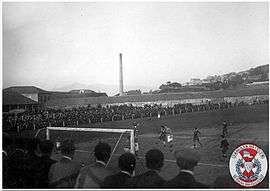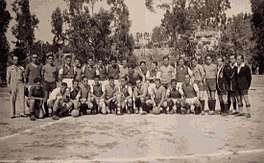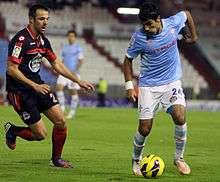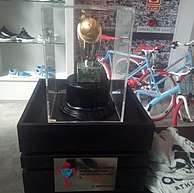RC Celta de Vigo
 | |||
| Full name | Real Club Celta de Vigo, S.A.D. | ||
|---|---|---|---|
| Nickname(s) |
Célticos (The Celts/Celtics) Celestes (The Sky Blues) O Celtiña (The Lovely/Little Celta) | ||
| Founded | 23 August 1923 | ||
| Ground | Abanca-Balaídos | ||
| Capacity | 29,000[1] | ||
| Coordinates | 42°12′42.609″N 8°44′22.9266″W / 42.21183583°N 8.739701833°WCoordinates: 42°12′42.609″N 8°44′22.9266″W / 42.21183583°N 8.739701833°W | ||
| President | Carlos Mouriño1 | ||
| Head Coach | Antonio Mohamed | ||
| League | La Liga | ||
| 2017–18 | La Liga, 13th | ||
| Website | Club website | ||
|
| |||
Real Club Celta de Vigo (Galician pronunciation: [reˈal ˈkluβ ˈθelta ðe ˈβiɣo]; Royal Club Celta de Vigo), commonly known as Celta Vigo or simply Celta, is a Spanish professional football club based in Vigo, Galicia, currently playing in La Liga. It was founded on 23 August 1923 following the merger of Real Vigo Sporting and Real Fortuna Football Club. Nicknamed Os Celestes (The Sky Blues), they play in sky blue shirts and socks along with white shorts. The club's home stadium is the Abanca-Balaídos, which seats 29,000 spectators. Celta's name is derived from the Celts who were once present in the region. Its main rival is fellow Galician club Deportivo de La Coruña, with whom it contests the Galician derby.
Celta have never won the league title nor Copa del Rey, although they have reached the final three times in the latter. One of the team's best seasons was 1970–71, when they finished unbeaten at home and were known as the "giant-killers". Celta came sixth that season and qualified for the UEFA Cup for the first time. The club finished in their best-ever position of fourth in 2002–03, qualifying for the 2003–04 UEFA Champions League, where they were eliminated by Arsenal in the Round of 16. In the 2016–17 UEFA Europa League, Celta reached the semi-finals of the UEFA Europa League for the first time, losing to Manchester United.
History
Foundation


R.C. Celta de Vigo was formed as a result of the ambition of Vigo's teams to achieve more at national level, where the Basque sides had been their bête noire in the Spanish Championship. The idea was to merge both teams to create a more powerful team at national level. The standard-bearer of this movement was Manuel de Castro, known as "Handicap", a sports writer for the Faro de Vigo who, from 1915, began to write in his articles about the need for a unitarian movement. The slogan of his movement was "Todo por y para Vigo" ("All for and to Vigo"), which eventually found support among the managers of Real Vigo Sporting and Real Club Fortuna de Vigo. It was backed unanimously when de Castro himself presented the motion at the assembly of the Royal Spanish Football Federation in Madrid on 22 June 1923.
On 12 July 1923, at the annual general meetings (AGMs) of Vigo and Fortuna held at the Odeon Theatre and in the Hotel Moderno, respectively, the merger was approved. Thus the "Team of Galicia" was born, as it was dubbed. In the last AGM of Fortuna and Vigo to approve the formation of a new club held on 10 August 1923, the members decided upon the team's name. Various names suggested include "Real Unión de Vigo", "Club Galicia", "Real Atlántic", "Breogán" and "Real Club Olimpico". The latter name was popular, but they eventually decided on "Real Club Celta", an ethnic race linked to Galicia (see Celts). The first president of Celta was Manuel Bárcena de Andrés, the Count of Torre Cedeira. At this AGM, the squad was also decided, which numbered 64 players in total and included some notable players from both Fortuna and Vigo:
- Goalkeepers: Isidro, Lilo and Rubido
- Defenders: Otero, Pasarín, Juanito Clemente, Daniel y Kaíto
- Midfielders: Jacobo Torres, Balbino, Queralt, Hermida, Pombo, Cruces, Córdoba, Máximo y Bienvenido
- Forwards: Reigosa, Chiarroni, Posada, Polo, Correa, Gerardito, Ramón González, Caride, Pinilla, Salvador, Chicha, Miguelito y Casal, Park.
- Manager: Francis Cuggy
EuroCelta
1997 through to 2003 saw arguably the best results in Celta's history, this period They were dubbed "EuroCelta" by the Spanish press as a result of their European exploits, notable results included a 4–1 aggregate win against Liverpool in the 1998–99 UEFA Cup, a 4–0 second leg thumping of Juventus in the 1999–2000 UEFA Cup and a 7–0 home win against Benfica also in the 1999–2000 UEFA Cup.
The club would qualify for the 2003–04 UEFA Champions League eventually going out in the last 16 to Arsenal 5–2 on aggregate.
Key players during the period included Alexander Mostovoi, Valery Karpin and Haim Revivo, though the squad also relied upon other international players as well, such as goalkeeper Pablo Cavallero; defender and future coach Eduardo Berizzo, midfielders Claude Makélélé and Mazinho; winger Gustavo López; and strikers Catanha and Lyuboslav Penev, amongst others.
Decline

Celta had a dramatic reversal of fortune in 2003–04. In the previous season, they finished fourth in the league, putting them in the third qualifying round of the Champions League. Celta entered the group phase after eliminating Slavia Prague, and eventually reached the last 16 before being knocked out by Arsenal. However, their domestic form was disastrous, finishing second-to-last in La Liga, thus sealing their relegation to the Segunda División. Although the squad was heavily dismantled following the demotion, Celta earned an immediate return to the top flight after finishing second in 2004–05.
In the 2005–06 season, they finished sixth earning a return once more to the UEFA Cup. They made it to the last 16 in that competition as well before losing to German side Werder Bremen. The next year, 2006–07, Celta finished in 18th and were once again relegated to the Segunda División. At the end of June 2007, Celta avoided going into administration. However, if an agreement was not put in place between the club and its creditors within three months, then courts would declare the liquidation of the club's assets.
Due to heavy debt, the club was forced to sell many players and make tremendous cuts in the club's finances. Since then, they have been relying mainly on the reserve team, combined with some inexpensive signings. During the first three seasons in the Segunda División, the club struggled to avoid further relegation, all amid fears of the club's complete disappearance. This was a period of high instability, with constant changes of managers and players. In the 2010–11 season, however, the signings of striker David Rodríguez, winger Enrique de Lucas and manager Paco Herrera turned the situation around. The club finished sixth after a fantastic season and qualified for promotion. Nevertheless, they were eliminated in the first knockout round by Granada after a penalty shootout, the game having finished 1–1 in 90 minutes.
Return to La Liga

On 3 June 2012, Celta returned to La Liga after a five-year absence.[2] In their first season back, they avoided relegation to the Segunda División on the final day after beating RCD Espanyol 1–0 to ensure a 17th-place finish. On 8 June 2013, Celta announced they had signed former Roma and then-Barcelona B manager Luis Enrique to lead the club for the 2013–14 season. Under Luis Enrique, Celta flourished, finishing ninth. After Luis Enrique's departure, his replacement, Eduardo Berizzo, led the team to eighth in La Liga during 2014–15, and the following season saw Celta's highest finish in ten years, finishing in sixth position[3] and earning a place in the 2016–17 UEFA Europa League.
In their return to European competitions, Celta reached the semifinals of the 2016–17 UEFA Europa League, where they were eliminated in the semifinals by Manchester United.
Club identity
Kit
Celta's original team strip consisted of a red shirt, black shorts and blue socks. This was later changed at an unknown date to the traditional sky blue and white strip, representative of the Galician flag.
Celta had the longest-running sponsorship deal in Spanish football, and one of the longest-running in the world, with the French automobile manufacturer Citroën from 1985 to 2016. The company established its plant within walking distance from Balaídos in 1958, and first sponsored the club's women's basketball team in 1980. In 2016, the sponsor was changed to the Galician brewery Estrella Galicia, which had advertised on the back of the shirts since 2011.[4] Their business deal with kit supplier, Umbro, was also one of the longest-running ones, from 1986 to 2010.[5]
| Years | Kit manufacturer | Sponsor |
|---|---|---|
| 1980–82 | Meyba | None |
| 1982–86 | Adidas | |
| 1986–10 | Umbro | Citroën |
| 2010–13 | Li-Ning | |
| 2013–16 | Adidas | |
| 2016– | Estrella Galicia |
Crest
Like many other Galician clubs, such as Compostela and Racing Ferrol, the club badge is based on the red cross of Saint James. On top of the cross sits a sky blue shield with two letter "Cs" (Club Celta). In 1923, Celta became one of several Spanish football clubs that were granted patronage by the Spanish crown and thus entitled to use Real (Royal) in their names and the royal crown on their badge. This right was granted to Celta by Alfonso XIII, and the club subsequently became known as Real Club Celta de Vigo. During the Spanish Second Republic (1931–1936), the title Real was removed from the club's name and the royal crown was taken off the club crest; however, it was returned under the Spanish State.
Seasons
|
|
|
- 52 seasons in La Liga
- 32 seasons in Segunda División
- 1 season in Segunda División B
- 1 season in Tercera División
- 1 Participations in the UEFA Champions League / European Cup
- 8 Participations in the UEFA Europa League / UEFA Cup
European history
- Celta score listed first.
| Season | Round | Competition | Club | Home | Away | Aggregate |
|---|---|---|---|---|---|---|
| 1971–72 | UEFA Cup | First round | 0–2 | 0–1 | 0–3 | |
| 1998–99 | UEFA Cup | First round | 7–0 | 1–0 | 8–0 | |
| Second round | 0–1 | 3–1 | 3–2 | |||
| Third round | 3–1 | 1–0 | 4–1 | |||
| Quarter-finals | 1–2 | 0–0 | 1–2 | |||
| 1999–00 | UEFA Cup | First round | 2–3 | 4–0 | 6–3 | |
| Second round | 2–2 | 2–0 | 4–2 | |||
| Third round | 7–0 | 1–1 | 8–1 | |||
| Fourth round | 0–1 | 4–0 | 4–1 | |||
| Quarter-finals | 0–0 | 1–2 | 1–2 | |||
| 2000 | UEFA Intertoto Cup | Third round | 3–0 | 2–1 | 5–1 | |
| Semi–finals | 1–0 | 2–1 | 3–1 | |||
| Finals | 2–1 | 2–2 | 4–3 | |||
| 2000–01 | UEFA Cup | First round | 0–0 | 1–0 | 1–0 | |
| Second round | 0–1 | 3–0 | 3–1 | |||
| Third round | 0–0 | 1–0 | 1–0 | |||
| Fourth round | 0–0 | 2–1 | 2–1 | |||
| Quarter-finals | 3–2 | 1–2 | 4–4 (a) | |||
| 2001–02 | UEFA Cup | First round | 4–0 | 3–4 | 7–4 | |
| Second round | 3–1 | 0–3 | 3–4 | |||
| 2002–03 | UEFA Cup | First round | 2–0 | 0–1 | 2–1 | |
| Second round | 3–0 | 1–1 | 4–1 | |||
| Third round | 2–1 | 0–1 | 2–2 (a) | |||
| 2003–04 | UEFA Champions League | Third qualifying round | 3–0 | 0–2 | 3–2 | |
| Group H | 3–2 | 0–1 | 2nd | |||
| 1–1 | 1–1 | |||||
| 0–0 | 2–1 | |||||
| Round of 16 | 2–3 | 0–2 | 2–5 | |||
| 2006–07 | UEFA Cup | First round | 1–0 | 3–0 | 4–0 | |
| Group H | 1–1 | N/A | 2nd | |||
| N/A | 1–2 | |||||
| 1–0 | N/A | |||||
| N/A | 1–1 | |||||
| Round of 32 | 1–1 | 2–1 | 3–2 | |||
| Round of 16 | 0–1 | 0–2 | 0–3 | |||
| 2016–17 | UEFA Europa League | Group G | 2–2 | 2–3 | 2nd | |
| 1–1 | 1–1 | |||||
| 2–0 | 2–0 | |||||
| Round of 32 | 0–1 | 2–0 | 2–1 | |||
| Round of 16 | 2–1 | 2–0 | 4–1 | |||
| Quarter-finals | 3–2 | 1–1 | 4–3 | |||
| Semi-finals | 0–1 | 1–1 | 1–2 |
Current squad
- As of 31 August 2018[6]
Note: Flags indicate national team as defined under FIFA eligibility rules. Players may hold more than one non-FIFA nationality.
|
|
Reserve team
Note: Flags indicate national team as defined under FIFA eligibility rules. Players may hold more than one non-FIFA nationality.
|
Out on loan
Note: Flags indicate national team as defined under FIFA eligibility rules. Players may hold more than one non-FIFA nationality.
|
Club records
As of 1 August 2017[7]
- Most league goals – 107, Hermidita (1945–56)
- Most Primera División league goals – 104, Hermidita (1945–56)
- Most goals in a season – 69, (1998–99)
- Most league appearances – 432, Manolo (1966–82)
- Current player with most league appearances – 221, Hugo Mallo
- Biggest win and biggest home win – 10–1 (v. Gimnàstic, 23 October 1949)
- Biggest away win – 1–6 (v. Athletic Bilbao, 24 March 2002)
- Biggest defeat and biggest away defeat – 10–0 (v. Athletic Bilbao, 11 January 1942)
- Most Home points in a season –
- Most Away points in a season – 18 (2006–07)
- Record transfer fee paid – €13.5 million, Catanha from Málaga (summer of 2000)
- Record transfer fee received – €18 million, Nolito to Manchester City (summer of 2016)
Player records
As of 19 May 2018[7]
Most appearances
|
Most goals
|
Internationals playing at Celta
Club officials
President
Vice presidents
- Ricardo Barros Hermida
- Pedro Posada
Senior club staff
- General manager: Antonio Chaves
- Director of Football: Felipe Miñambres
- Director of Youth Teams: Carlos Hugo García-Bayón
- Club Delegate: Vladimir Gudelj
- Administrative Director: María José Herbón
- Head of PR: José Carlos Bastos
Coaching staff
- Head coach: Antonio Mohamed
- Assistant manager: Robert Moreno
- Assistant coach: Joaquin Valdes
- Fitness coach: Rafel Pol
- Goalkeeping coach: Fernando Villa
Former managers
|
|
|
|
Presidents
|
|
|
|
Celta Vigo B
Celta de Vigo B is Celta's youth team. It was founded in 1996 and plays in the Segunda División B.
Honours
National titles
- Winners (3): 1935–36, 1981–82, 1991–92
- Runners-up (7): 1959–60, 1960–61, 1965–66, 1968–69, 1975–76, 2004–05, 2011–12
- Winners (1): 1980–81
- Winners (1): 1930–31
European titles
- Winners (1): 2000
Regional titles
- Galician Championship[9]
- Winners (6): 1923–24, 1924–25, 1925–26, 1929–30, 1931–32, 1933–34
- Asturian-Galician Championship
- Winners (1): 1934–35
- Galician Cup
- Winners (2): 2007, 2008
Youth titles
- Runners-up (2): 2008–09, 2012–13
Friendly
- Winners (21): 1972, 1973, 1975, 1976, 1980, 1984, 1986, 1988, 1991, 1992, 1993, 1997, 1998, 1999, 2000, 2002, 2005, 2006, 2008, 2009, 2012
- Runners-up (14): 1971, 1974, 1978, 1979, 1981, 1982, 1987, 1989, 1995, 1996, 2001, 2003, 2004, 2007
- Winners (18): 1995, 1996, 1998, 1999, 2000, 2001, 2002, 2003, 2004, 2005, 2007, 2008, 2009, 2011, 2012, 2013, 2014, 2015
- Runners-up (4): 1997, 2010, 2017, 2018
- Winners (1): 2016
- Winners (1): 1999
- Trofeo Xacobeo
- Winners (1): 1999
- Trofeo Federación Galega
- Winners (2): 2014, 2016
Individual
- Pichichi (1)
- 1947–48 –

- Zamora (3)
- 1992–93 –

- 2002–03 –

- 2005–06 –

Notes
- 1.^ Carlos Mouriño is the plurality shareholder, with 35%, and as such is the club president.
See also
References
- ↑ "CLUB".
- ↑ Editorial, Reuters. "Celta back in La Liga after five-year absence".
- ↑ http://www.espnfc.co.uk/spanish-primera-division/15/table?season=2015
- ↑ "Adiós a un patrocinador histórico: Tras 31 años con Citroën" [Goodbye to a historic sponsor: After 31 years with Citroën]. Sport (in Spanish). 1 June 2016. Retrieved 10 March 2017.
- ↑ "El Celta y Umbro concluyen un cuarto de siglo de relación comercial" [Celta and Umbro conclude a quarter of a century of business partnership]. Faro de Vigo (in Spanish). 1 July 2010. Retrieved 10 March 2017.
- ↑ "RC Celta » Squad". Celta de Vigo.
- 1 2 "Celta Vigo" [First team]. BDFutbol. Retrieved 1 August 2017.
- ↑ http://www.scottishsporthistory.com/sports-history-news-and-blog/scottish-footballs-mexican-adventure-in-1946
- ↑ "Spain – List of Champions of Galicia". Rsssf.com. 30 July 2004. Retrieved 2012-03-24.
Further reading
- González Villar, Celso. Albores do fútbol Vigues (in Galician).
- Cros, Jaime (1973). El Celta y la Liga (in Spanish). Murcia: APANDA de Artes Gráficas, S.A. ISBN 84-605-5851-7.
- Cros, Jaime (1974). Celta 74 (in Spanish).
- Álvarez, Eugenio (2004). A historia do Celta (1992–2004) (in Spanish). Vigo. p. 272.
- Ball, Phil (2001). "Raining Champions". Morbo: The Story of Spanish Football. Kings Lynn, England: WSC Books. pp. 165–181. ISBN 0-9540134-6-8.
External links
| Wikimedia Commons has media related to RC Celta de Vigo. |
- Official website (in Spanish) (in Galician) (in English)
- Celta de Vigo at La Liga (in English) (in Spanish)
- Celta de Vigo at UEFA (in English) (in Spanish)
